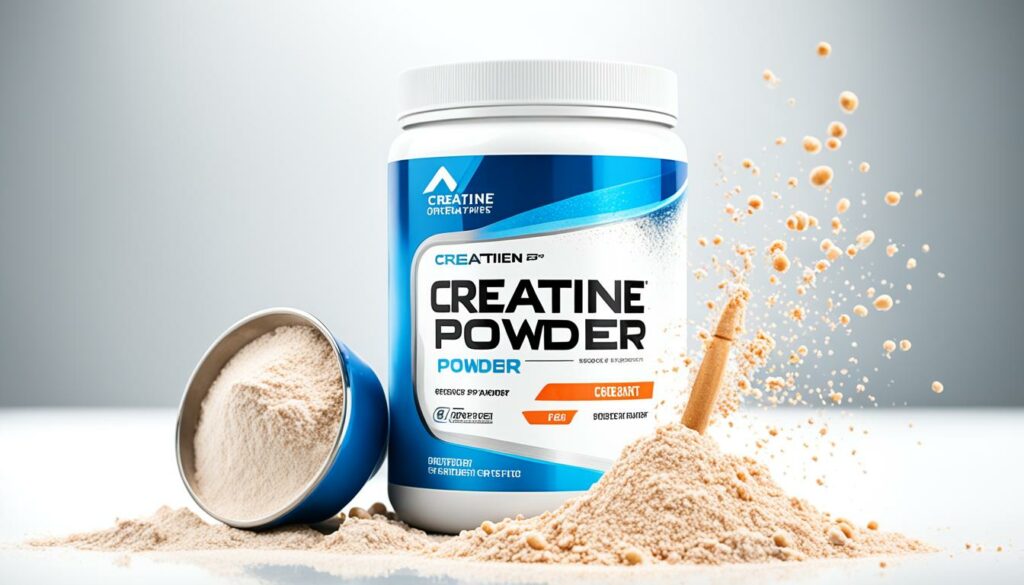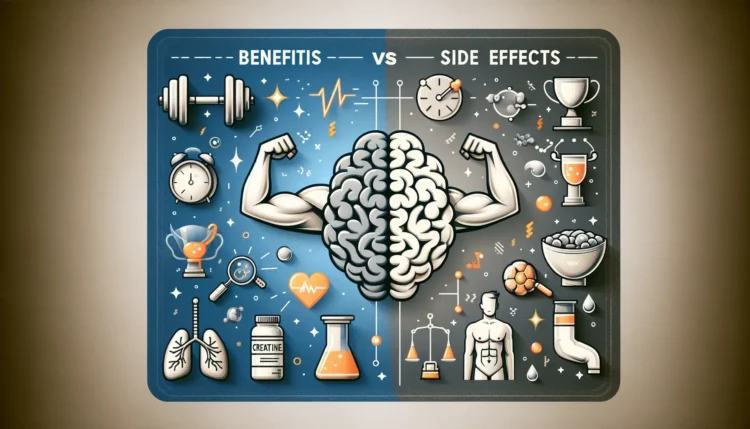Did you know that creatine supplementation is used by over 40% of collegiate athletes in the United States? It’s a staggering statistic that highlights the widespread popularity of this performance-enhancing supplement.
Creatine has become a go-to choice for athletes, bodybuilders, and fitness enthusiasts looking to maximize their muscle growth, enhance their exercise performance, and improve their overall athletic abilities.
Creatine offers a wide range of benefits that make it highly sought after in the world of sports and fitness. From boosting muscle growth and increasing strength to improving recovery time and supplying the body with energy during intense workouts, the potential advantages of creatine supplementation are undeniable.
However, it’s crucial to understand that like any supplement, creatine does come with potential side effects that need to be considered before incorporating it into your routine.
In this comprehensive guide, we will dive deep into the world of creatine. We will examine how it works, explore its benefits and potential side effects, address common misconceptions, and provide you with the information you need to make an informed decision about whether creatine supplementation is right for you.
Key Takeaways:
- Creatine supplementation is used by over 40% of collegiate athletes in the United States.
- Creatine can enhance muscle growth, improve exercise performance, increase strength, and boost recovery.
- There are potential side effects of creatine, such as impacts on kidney and liver health, digestive issues, and slight weight gain.
- Creatine does not cause dehydration, muscle cramps, acne, compartment syndrome, or rhabdomyolysis.
- Daily creatine supplementation, even at high doses, is generally safe for extended periods.
Understanding Creatine and How it Works
Creatine is an essential amino acid that plays a crucial role in energy production within the body. It aids in the synthesis of adenosine triphosphate (ATP), which is the primary energy source for muscle contractions during exercise. During high-intensity activities, the body quickly depletes its ATP stores, leading to fatigue and decreased performance.
By supplementing with creatine, individuals can increase their phosphocreatine levels in the muscles. Phosphocreatine serves as a readily available source of creatine phosphate, allowing for a rapid reformation of ATP.
This enables the muscles to continue contracting at a high intensity for longer durations, ultimately enhancing performance and delaying muscle fatigue.
Research has shown that creatine supplementation can provide significant benefits, particularly in activities that require short bursts of energy, such as weightlifting and sprinting. By increasing ATP production, creatine helps to fuel intense muscle contractions and optimize muscle energy levels.
In addition to its role in ATP production, creatine also has the potential to increase protein synthesis, resulting in enhanced muscle growth and strength gains. This makes it a popular supplement choice among athletes and bodybuilders looking to maximize their training results.
“Creatine supplementation has been found to increase phosphocreatine stores in the muscles, leading to enhanced energy availability during high-intensity exercise.” – Dr. Sarah Johnson, Sports Nutritionist
How Does Creatine Work in the Body?
When creatine is consumed as a supplement, it is absorbed into the bloodstream and taken up by skeletal muscles. Once inside the muscle cells, creatine combines with the phosphate molecule to form phosphocreatine.
During intense physical activity, the breakdown of ATP releases a phosphate molecule, which can then be reattached to ADP (adenosine diphosphate) to regenerate ATP. This process, known as ATP resynthesis, relies on the presence of creatine to replenish the phosphate molecule.
The increased levels of phosphocreatine provided by creatine supplementation enable a faster and more efficient resynthesis of ATP. As a result, the muscles have an enhanced ability to sustain intense contractions and perform at higher levels of power and endurance.
Creatine and Muscle Energy
Creatine acts as a vital component in the body’s energy metabolism, specifically within the phosphocreatine system. This system plays a key role in providing energy for high-intensity, short-duration activities like weightlifting and sprinting.
When the demand for energy exceeds the ATP supply, the phosphocreatine system comes into play. Phosphocreatine releases a phosphate molecule to regenerate ATP, allowing the muscles to maintain their energy levels and continue contracting forcefully.
Adequate creatine levels in the body, whether obtained through dietary sources or supplementation, ensure optimal functioning of the phosphocreatine system. By increasing the availability of phosphocreatine, creatine supplementation provides the muscles with a larger reserve of ATP, ultimately promoting greater energy production and enhanced athletic performance.
The Role of ATP in Exercise Performance
ATP is often referred to as the “energy currency” of the body. It is required for all cellular processes, including muscle contractions during physical activity. During exercise, ATP is constantly being utilized and regenerated to meet the energy demands of the muscles.
The availability of ATP directly impacts an individual’s exercise performance. As ATP levels decrease, muscle fatigue sets in, leading to a decline in strength, power, and endurance.
Creatine supplementation increases the concentration of phosphocreatine in the muscles, allowing for a more rapid resynthesis of ATP during periods of intense activity. This enhanced ATP regeneration prolongs the availability of energy, enabling individuals to push harder, train longer, and achieve better results.
| Benefits of Creatine: | How Creatine Works: |
|---|---|
| Enhanced muscle growth | Increased phosphocreatine levels |
| Improved exercise performance | Faster ATP resynthesis |
| Increased strength and power | Optimized energy metabolism |
| Delayed muscle fatigue | Enhanced ATP availability |
Benefits of Creatine Supplementation
Research suggests that creatine supplementation can provide numerous benefits for individuals engaging in physical activities. These benefits include improved muscle growth, enhanced exercise performance, increased strength, and accelerated muscle recovery.
Enhanced Muscle Growth
One of the key benefits of creatine supplementation is its ability to enhance muscle growth. Creatine promotes an increase in muscle protein synthesis, which is essential for muscle development and repair.
By increasing the availability of energy during workouts, creatine helps individuals push their muscles to the limit, resulting in greater muscular hypertrophy over time.
Improved Exercise Performance
Creatine has been shown to improve exercise performance, particularly in activities that require short bursts of energy. It enhances the body’s ability to produce adenosine triphosphate (ATP), the primary source of energy for muscle contractions.
This results in increased power and explosiveness during high-intensity exercises such as weightlifting, sprinting, and jumping.
Increased Strength
In addition to supporting muscle growth, creatine supplementation can also lead to increased strength. By improving energy production and reducing muscular fatigue, creatine allows individuals to lift heavier weights and perform more repetitions.
This increased strength not only benefits athletes and weightlifters, but it can also be advantageous for individuals in various sports and everyday activities.
Enhanced Muscle Recovery
Intense workouts can cause muscle damage and inflammation, leading to delayed recovery and increased soreness. Creatine supplementation has been suggested to aid in muscle recovery by reducing muscle damage and inflammation markers.
This allows individuals to recover faster between workouts, enabling them to maintain a consistent training regimen and optimize their performance.
Overall, creatine supplementation can be a valuable tool for individuals looking to maximize their muscle growth, exercise performance, strength, and recovery. It is important to note that individual responses may vary, and consulting with a healthcare professional before starting any supplementation is recommended.

Potential Side Effects of Creatine
While creatine supplementation is generally considered safe, it is important to be aware of potential side effects. Although research has not definitively proven any significant harm, there are some concerns regarding kidney and liver health.
Some individuals may experience digestive issues, such as diarrhea, especially when higher doses of creatine are consumed. It is recommended to start with lower doses and gradually increase the intake to minimize the likelihood of such side effects.
Another potential side effect of creatine supplementation is slight weight gain. This weight gain is primarily due to increased water content in the muscles rather than fat accumulation. Therefore, it’s important not to confuse this temporary water retention with actual weight gain.
It’s worth noting that the potential side effects of creatine are generally minimal and not experienced by everyone. However, if you have pre-existing kidney or liver health concerns, it is advisable to consult with a healthcare professional before incorporating creatine into your supplement routine.
Creatine and Other Drug Interactions
When considering the use of creatine supplements, it is important to be aware of potential drug interactions. Creatine can affect blood sugar management, making it crucial for individuals taking medications that impact blood sugar levels to consult with a healthcare professional before starting supplementation.
In addition, individuals with pre-existing liver or kidney concerns should exercise caution and seek medical advice before using creatine. These individuals may have specific health considerations that need to be taken into account to ensure their safety and well-being.
Overview of Creatine and Drug Interactions
| Drug Class | Potential Interaction |
|---|---|
| Antidiabetic medications | Creatine can affect blood sugar levels, potentially interacting with the effectiveness of antidiabetic medications. Consult with a healthcare professional to monitor blood sugar levels and adjust medication as necessary. |
| Medications metabolized by the liver | Creatine may have an impact on liver function and the metabolism of certain medications. Consult with a healthcare professional to evaluate potential interactions and adjust medication dosages if needed. |
| Medications metabolized by the kidneys | Creatine can put additional stress on the kidneys, potentially affecting the metabolism of certain medications. Consult with a healthcare professional to assess the risk of interactions and adjust medication dosages as necessary. |
By considering potential drug interactions and seeking professional guidance when needed, individuals can use creatine supplements safely and effectively.

Addressing Common Misconceptions
While creatine supplementation is widely used for its numerous benefits, there are several misconceptions surrounding its use. In this section, we will address some of the common misconceptions and clarify the facts.
Creatine and Dehydration
Misconception: There is a belief that creatine supplementation can cause dehydration.
Contrary to this belief, research suggests that creatine does not cause dehydration and may even have a hydrating effect on the body. In fact, creatine supplementation has been shown to increase total body water content, enhancing hydration levels and improving overall exercise performance.
Creatine and Muscle Cramping
Misconception: Creatine supplementation increases the risk of muscle cramps.
This misconception is not supported by scientific evidence. In reality, creatine has been found to have a significant impact on reducing muscle cramping and improving muscle function. It can help to increase muscle strength and endurance, reducing the likelihood of experiencing muscle cramps during exercise.
Creatine and Acne
Misconception: Creatine supplementation causes acne breakouts.
Research indicates that there is no direct link between creatine supplementation and acne. In fact, some studies have even suggested that creatine could have positive effects on skin health. It is important to note that individual experiences may vary, and if you have concerns about acne breakouts, it is advisable to consult with a dermatologist.
Creatine, Compartment Syndrome, and Rhabdomyolysis
Misconception: Creatine supplementation can cause compartment syndrome or rhabdomyolysis.
Claims of creatine causing compartment syndrome or rhabdomyolysis are unfounded and not supported by scientific research. Compartment syndrome and rhabdomyolysis are serious medical conditions that can result from factors unrelated to creatine supplementation. It is important to seek medical advice if you have any concerns regarding these conditions.
To summarize, creatine supplementation does not cause dehydration, increase the risk of muscle cramps, or lead to acne breakouts. Claims of creatine causing compartment syndrome or rhabdomyolysis lack scientific evidence.
Understanding the facts and dispelling these misconceptions can help individuals make informed decisions about incorporating creatine into their fitness regimen.
Safety of Daily Creatine Supplementation
When it comes to daily creatine supplementation, safety is a crucial consideration. Fortunately, research suggests that creatine can be safely supplemented on a daily basis, even at high doses, for extended periods of time.
A number of studies have been conducted on healthy individuals who consumed high doses of creatine for up to five years, and no significant adverse effects were observed. This indicates that creatine is generally well-tolerated by the body, making it a reliable choice for long-term use.
Furthermore, creatine has been utilized in the treatment of various conditions without displaying any negative side effects. This further reinforces its safety profile and demonstrates its potential as a beneficial supplement for individuals seeking to improve their health and wellbeing.
However, it’s important to note that while creatine is considered safe, it’s always advisable to follow recommended dosages and consult with a healthcare professional, especially if you have any pre-existing health concerns. This ensures that you are taking the supplement in a manner that aligns with your individual needs and circumstances.
By prioritizing safety and responsible usage, individuals can confidently incorporate creatine into their daily supplementation routine, leveraging its potential benefits for optimal health and performance.
Conclusion
Creatine supplementation offers numerous potential benefits, making it a popular choice among athletes, bodybuilders, and fitness enthusiasts. Notably, creatine has been shown to enhance muscle growth, improve exercise performance, increase strength, and promote faster recovery.
However, it is important to be aware of potential side effects and consult with a healthcare professional before starting creatine supplementation, particularly if you have pre-existing health conditions or are taking other medications.
While there are potential risks associated with creatine, such as impacts on kidney and liver health, digestive issues, and slight weight gain, these side effects are generally minimal and can be managed with proper use. By understanding the potential benefits and side effects, individuals can make informed decisions about incorporating creatine into their fitness regimen.
In conclusion, creatine supplementation can be a valuable tool for those seeking to maximize their muscle growth, enhance their exercise performance, and improve their overall fitness.
However, it is essential to approach creatine supplementation responsibly, following recommended dosages and seeking professional guidance when necessary. With proper use, the benefits of creatine can be harnessed while minimizing any potential side effects.
FAQ
What is creatine?
Creatine is an amino acid that plays a crucial role in energy production within the body. It helps in the synthesis of adenosine triphosphate (ATP), which is the primary energy source for muscle contractions during exercise.
What are the benefits of creatine supplementation?
Creatine supplementation can enhance muscle growth, improve exercise performance, increase strength, and enhance recovery, especially in activities that require short bursts of energy.
What are the potential side effects of creatine?
Creatine supplementation may have potential impacts on kidney and liver health. Digestive issues such as diarrhea and slight weight gain due to increased water content in the muscles are also possible side effects to consider.
Are there any drug interactions with creatine?
Creatine can affect blood sugar management, so individuals taking medications that impact blood sugar levels should consult with a healthcare professional before starting supplementation. Individuals with pre-existing liver or kidney concerns should also exercise caution and seek medical advice before using creatine.
Are there any misconceptions about creatine?
Yes, there are misconceptions surrounding creatine supplementation. It does not cause dehydration or increase the risk of muscle cramps. It also does not cause acne, and claims of creatine causing compartment syndrome or rhabdomyolysis are unfounded.
Is daily creatine supplementation safe?
Research indicates that daily creatine supplementation, even at high doses, is generally safe and well-tolerated for extended periods. Studies have shown no significant adverse effects in healthy individuals who consumed high doses of creatine for up to five years.
What is the conclusion about creatine supplementation?
Creatine supplementation offers potential benefits such as enhanced muscle growth, improved exercise performance, increased strength, and enhanced recovery. While there are potential side effects to consider, these risks are generally minimal.
It is recommended to consult with a healthcare professional before starting creatine supplementation, especially if you have pre-existing health conditions or are taking other medications.




